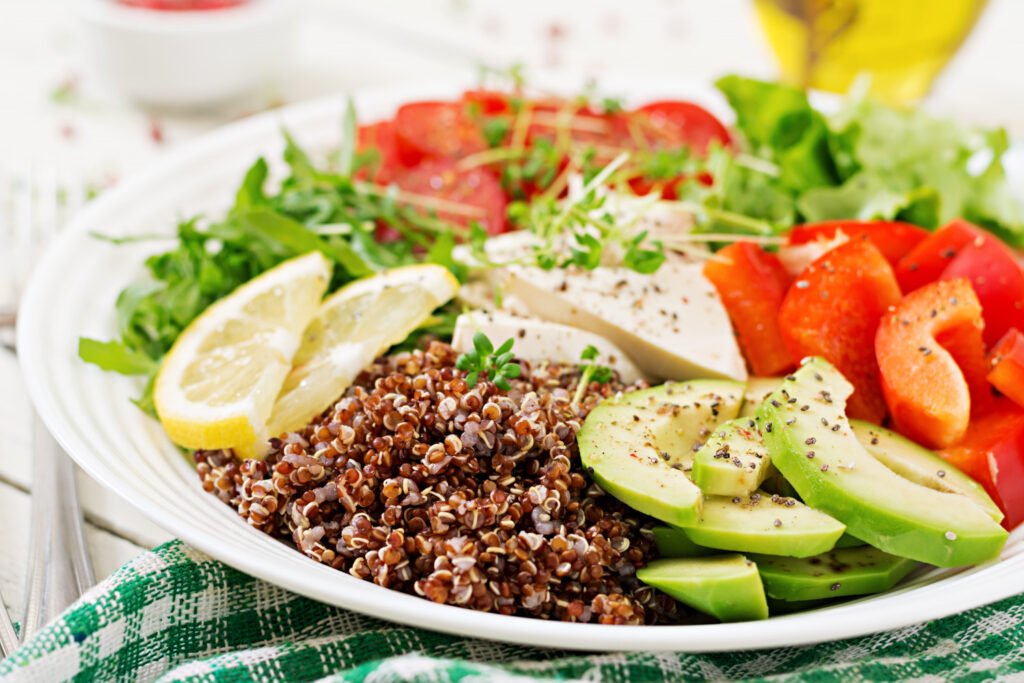
In this article
overview
Carbohydrates have become a hot topic in the world of nutrition, with some diets glorifying them and others vilifying them. But the truth lies somewhere in between. Carbohydrates are essential to your body’s daily functions, but the type of carbs you consume can make a significant difference in your overall health. In this guide, we’ll explore the best sources of carbohydrates and why they should be an integral part of your diet.
Why Carbohydrates Matter
Carbohydrates are your body’s primary source of energy, fueling everything from daily activities to intense workouts. Unlike fats and proteins, which your body can also use for energy, carbohydrates are the preferred and most efficient fuel source. However, not all carbohydrates are created equal. Understanding the difference between whole-food carbs and refined carbs is crucial for making healthier dietary choices
Types of Carbohydrates: Whole-Food vs. Refined
Carbohydrates can be categorized into two main types: whole-food carbs and refined carbs. Whole-food carbs, often referred to as complex carbohydrates, are unprocessed or minimally processed, retaining their natural fiber, vitamins, and minerals. These include fruits, vegetables, whole grains, and legumes. On the other hand, refined carbs are heavily processed, often stripping away beneficial nutrients. These include white bread, sugary snacks, and sodas. While both types provide energy, whole-food carbs offer additional health benefits that refined carbs do not.
Top 15 Healthy Carbohydrate-Rich Foods
Incorporating a variety of healthy, carbohydrate-rich foods into your diet can help ensure you’re getting the nutrients your body needs. Below are 15 excellent sources of carbohydrates that offer numerous health benefits:
1. Sweet Potatoes
Sweet potatoes are a nutritious, versatile root vegetable that can be used in many dishes. One large baked sweet potato (about 180g) provides 37.3g of carbohydrates, along with a healthy dose of potassium, vitamins A and C, and fiber. Research suggests that certain compounds in purple sweet potatoes may even have antioxidant and antitumor properties.
2. Beetroot
Beetroots, with their deep red color, are not only beautiful but also packed with nutrients. A cup of raw beets contains 13g of carbohydrates and is rich in potassium, calcium, folate, and vitamin A. Beets also contain naturally occurring inorganic nitrates, which are known to support heart health.
3. Corn
Corn is a staple in many diets around the world. A 100g serving of corn provides 18.7g of carbohydrates and 3.27g of protein. Corn is also a good source of vitamin C, which supports your immune system and skin health.
Whole-Grain Powerhouses
Whole grains are a fantastic source of complex carbohydrates, offering a rich supply of fiber, protein, and essential nutrients. Here are some whole grains that should be a part of your diet:
4. Quinoa
Quinoa is often considered a superfood, and for a good reason. One cup of cooked quinoa contains 39.4g of carbohydrates, 8.14g of protein, and is rich in minerals like magnesium, potassium, and phosphorus. Quinoa is also unique because it is a complete protein, containing all nine essential amino acids.
5. Brown Rice
Brown rice is a more nutritious alternative to white rice. A cup of cooked brown rice provides 45.8g of carbohydrates and is packed with antioxidants. Unlike white rice, brown rice retains its nutrient-rich bran and germ, making it a healthier choice.
6. Oats
Oats are incredibly versatile and can be enjoyed in many forms, including rolled, steel-cut, and quick oats. A cup of uncooked oats delivers a whopping 103g of carbohydrates, 26.4g of protein, and 16.5g of fiber. Oats have been shown to support heart health by reducing cholesterol levels.
Fruit: Nature’s Sweet Carbs
Fruits are not only delicious but also a great source of natural sugars and fibers. They provide essential vitamins and minerals that support overall health:
7. Bananas
Bananas are a convenient snack that offers 26.9g of carbohydrates per medium-sized fruit. They are rich in potassium, which is vital for heart health and muscle function, as well as vitamins A and C.
8. Apples
A medium apple provides about 20.6g of carbohydrates and is loaded with fiber, vitamins A and C, and potassium. Regular apple consumption has been linked to a lower risk of chronic diseases, including cancer.
9. Mangoes
Mangoes, known for their sweet and juicy flavor, offer 24.8g of carbohydrates per cup. They are also high in vitamins A and C, as well as potassium and fiber, making them a nutritious choice for satisfying your sweet tooth
Dried Fruits: Concentrated Nutrition
Dried fruits are a concentrated source of carbohydrates and other nutrients. However, be mindful of added sugars when choosing dried fruits:
10. Dates
Dates are naturally sweet and can serve as a healthy snack or dessert. A single Medjool date contains 18g of carbohydrates, along with fiber, calcium, potassium, and vitamin A.
11. Raisins
Raisins are dried grapes that pack 130g of carbohydrates per cup. They are also rich in potassium, magnesium, and antioxidants, which help protect your cells from damage.
12. Goji Berries
Goji berries are a nutritional powerhouse, providing 77g of carbohydrates and 13g of fiber per 100g serving. They are also an excellent source of vitamin A, which is essential for eye health.
Incorporating Carbohydrates into a Balanced Diet
Carbohydrates should be a significant part of your daily diet, but it’s essential to choose the right types. According to dietary guidelines, about 45% to 65% of your daily caloric intake should come from carbohydrates. For a 2,000-calorie diet, this equates to 225 to 325 grams of carbs per day.
To meet your carbohydrate needs while maintaining a balanced diet:
- Grains: Aim for at least half of your grain intake to be whole grains. Incorporate a variety of grains like quinoa, oats, and brown rice into your meals.
- Fruits and Vegetables: Consume at least two servings of fruit and 2.5 cups of vegetables daily. Focus on a diverse range of colors and types to maximize nutrient intake.
- Pulses: Beans, lentils, and chickpeas are excellent sources of carbs, fiber, and protein. Use them as meat substitutes in dishes like soups, salads, and stews.
- Dairy: Include three servings of dairy products daily. Opt for milk or yogurt, which contain lactose and provide additional carbohydrates.
The Takeaway: Carbs for a Healthier You
Carbohydrates are more than just a source of energy—they’re vital for overall health. By choosing whole-food sources of carbs, you can enhance your diet with essential nutrients that support heart health, digestive health, and more. Remember, not all carbs are created equal. Focus on quality over quantity to fuel your body in the best possible way.
Incorporating these nutrient-dense carbohydrate sources into your daily meals will not only help you meet your energy needs but also provide long-term health benefits. Make informed choices, enjoy a variety of whole-food carbs, and reap the rewards of a balanced diet
A Quick Review
Carbohydrates are essential for energy, but not all carbs are created equal. This article highlights the importance of choosing whole-food carbs like sweet potatoes, quinoa, and fruits over refined options. It offers a comprehensive guide on the healthiest carbohydrate-rich foods, explaining their benefits and how they can be part of a balanced diet. By focusing on nutrient-dense carbs, you can boost your health and maintain optimal energy levels.
Frequently asked questionsay
1. What are the healthiest sources of carbohydrates?
Healthy carbohydrate sources include whole grains like quinoa and oats, root vegetables like sweet potatoes, and fruits such as bananas and apples.
2. Why are whole-food carbs better than refined carbs?
Whole-food carbs are minimally processed, retaining their natural fiber, vitamins, and minerals, which provide more health benefits than refined carbs.
3. How much of my daily diet should come from carbohydrates?
Carbohydrates should make up about 45% to 65% of your daily caloric intake, depending on your total calorie needs.
4. Can I eat carbohydrates if I’m trying to lose weight?
Yes, focusing on whole-food carbs like fruits, vegetables, and whole grains can support weight loss by providing essential nutrients and fiber that promote satiety.
5. Are sweet potatoes better than regular potatoes?
Sweet potatoes offer more vitamins, particularly vitamin A, and are higher in fiber compared to regular potatoes, making them a healthier option.
6. What role do carbohydrates play in heart health?
Carbohydrates from whole grains and fruits can help reduce the risk of heart disease by lowering cholesterol levels and improving blood pressure.
7. Is it okay to eat dried fruits as a carb source?
Dried fruits can be a healthy carb source but should be consumed in moderation due to their high sugar content. Opt for unsweetened versions when possible.
8. How can I incorporate more whole grains into my diet?
Incorporate whole grains by choosing brown rice over white rice, adding quinoa to salads, or having oats for breakfast.












